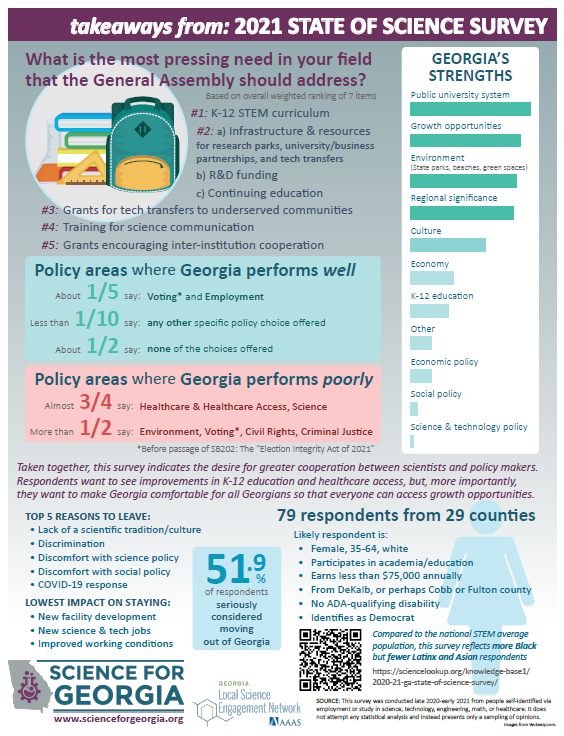The 2021 Georgia State of Science Survey was created to gain an accurate understanding of the needs and priorities of the science and technology communities. This survey was conducted between late 2020-early 2021 and advertised to members of the Georgia Science and Technology (S&T) community. There is no formal definition of this community, and respondents are self-identified via employment or study in science, technology, engineering, math, or healthcare.
79 respondents from 29 Georgia counties indicated that overall, they were dissatisfied with how expert advice and evidence is used in forming Georgia policy, as well as with the level of cooperation between policymakers and the scientific community.
One fifth said Georgia has done well in voting (note: this survey was conducted before the passage of GA voting legislation in early 2021) and employment.
Three fourths said Georgia could use improvement in healthcare access and science and one half noted that Georgia could do better in the environment, voting, civil rights, and criminal justice. The most pressing issue was K-12 STEM curriculum, infrastructure and resources for research parks, university/business partnerships, and tech transfers, and R&D funding.
Over 50% of respondents had considered moving out of Georgia due to a lack of science tradition and culture, discrimination, and discomfort with Georgia science policy. Positive changes including social acceptance of minority groups and demonstrated changes in Georgia social policy would entice them to stay.
Respondents believed that Georgia’s public university system, growth opportunities, and parks and green spaces were relative strengths of the state.
Taken together, this survey indicates the desire for greater cooperation between scientists and policy makers. Respondents want to see improvements in K-12 education and healthcare access, but, more importantly, they want to make Georgia comfortable for all Georgians so that everyone can access growth opportunities.
The respondents included 79 members of the Georgia S&T community. The demographics of the respondents reflected the racial breakdown of STEM fields, but did not reflect the gender breakdown, skewing heavily female.

